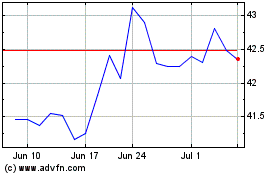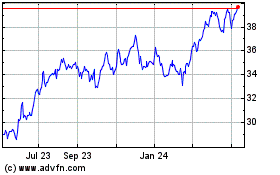By Saumya Vaishampayan and Corrie Driebusch
U.S. stocks pushed higher heading into the close in a volatile
session Tuesday, while U.S. oil prices declined for the seventh
straight session.
The Dow Jones Industrial Average gained 86 points, or 0.5%, to
16485, after declining as much as 77 points. The S&P 500 rose
0.7%, while the Nasdaq Composite was 0.9% higher.
The S&P 500's index of energy companies gained 0.2%, even as
oil prices briefly dropped below $30 a barrel.
While lower oil prices are traditionally viewed as a boon for
consumers and the economy more broadly, recent moves downward have
raised the specter of bankruptcies in the energy sector, weighing
on broader indexes.
Williams Cos. shares tumbled 11% to $16.58. Mining company
Freeport-McMoRan Inc. fell 5.8% to $4.06. The company's shares are
down close to 40% so far this year.
The moves came as Chinese stocks managed to eke out a gain.
Sharp declines in Chinese shares have rattled global markets this
year.
"China had a considerably less volatile session than we had the
last several weeks so that helped calm sentiment a bit, but this
decline that started out of China continues to persist," said Ryan
Larson, head of U.S. equity trading for RBC Global Asset
Management. "China is still slowing, and oil is now flirting with
$30."
The Shanghai Composite inched up 0.2% after swinging between
gains and losses during the session.
Investors also pointed to moves in China's currency. The onshore
Chinese yuan steadied for the third day in a row after weakening
sharply last week and the offshore yuan rose to its highest level
against the U.S. dollar so far this year.
The offshore yuan rallied as state-owned banks bought the
currency and sold U.S. dollars aggressively, traders said, a sign
that China's central bank was intervening to narrow the gap between
the onshore and offshore rates, which closed briefly Tuesday.
As a result, liquidity tightened in the offshore market, sending
the benchmark overnight borrowing costs for the offshore yuan to a
high. Higher borrowing costs make it more expensive to bet against
the yuan--traders have to borrow yuan to sell, or short, the
currency--thus putting a floor under the offshore yuan market.
A stronger dollar and failure to stem a global glut of supply
have weighed on oil prices in recent months, while mounting
concerns about China's slowing growth have magnified fears about
demand from the world's second-largest economy.
Traditional haven assets lost a bit of ground Tuesday. Gold fell
0.6% to $1,090 an ounce.
In currencies, the dollar was up 0.3% against the yen at
Yen117.9530, while the euro was down 0.2% against the dollar at
$1.0837.
The British pound fell 0.8% against the dollar to $1.4434, its
lowest level since 2010, as unexpectedly weak U.K. industrial data
added to concerns about the manufacturing sector. The Bank of
England will hold its first policy meeting of the year this week,
and economists forecast no change to benchmark interest rates.
Tuesday's moves came after the Dow industrials snapped a losing
streak on Monday in a rocky session.
After U.S. markets closed, aluminum maker Alcoa unofficially
kicked off the fourth-quarter earnings season as it swung to a
loss. Shares are down 9.2% at $7.26.
Corporate profits are expected to take a hit from the stronger
dollar, slowing Chinese growth and sliding oil prices.
Investors are eyeing fourth-quarter earnings in hopes that
better-than-expected corporate results may help buoy stocks.
However, some remain wary of whether earnings will deliver.
"Valuations have been on the higher side...so it leaves us in a
bit of a precarious position," said Eric Wiegand, senior portfolio
manager at U.S. Bank Wealth Management. "If we don't see the
earnings growth to support that, we could see again an environment
of enhanced volatility," he added.
The S&P 500 recently traded at 17.4 times the past 12 months
of earnings, higher than its 10-year average of 15.7, according to
FactSet.
The moves in U.S. stocks come at an uncertain time for the
Federal Reserve, which is watching economic data closely as it
considers the path for raising interest rates. The U.S. economy
likely will withstand financial market volatility if it doesn't
last too long, allowing more interest-rate increases this year,
Federal Reserve Bank of Atlanta President Dennis Lockhart said
Monday.
Corrie Driebusch and Riva Gold contributed to this article.
Write to Leslie Josephs at leslie.josephs@wsj.com and Saumya
Vaishampayan at saumya.vaishampayan@wsj.com
(END) Dow Jones Newswires
January 12, 2016 15:59 ET (20:59 GMT)
Copyright (c) 2016 Dow Jones & Company, Inc.
Williams Companies (NYSE:WMB)
Historical Stock Chart
From Mar 2024 to Apr 2024

Williams Companies (NYSE:WMB)
Historical Stock Chart
From Apr 2023 to Apr 2024
